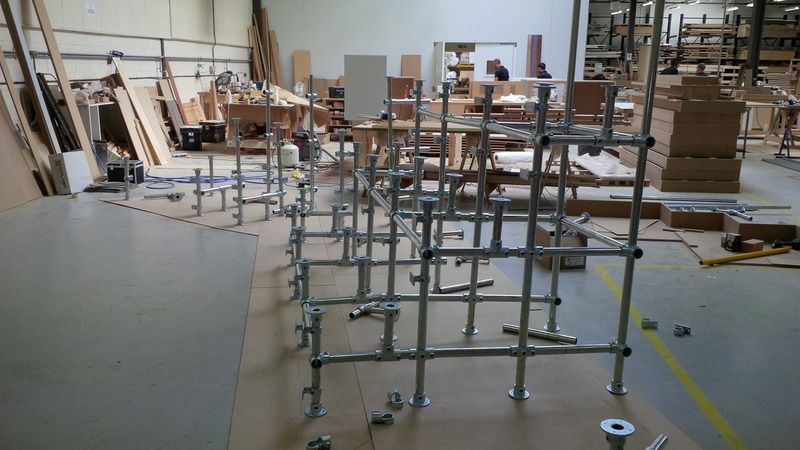Compression / weight loading on C42 Interclamp tube
Discussion
I would really appreciate some help on this. I need to find out what the maximum weight is for one post of 1' 1/4 C42 interclamp post is before it fails. The supplier I have bought it from has no idea. I know it is a lot as although it is monkey metal it has a OD of 42mm and a wall thickness of 5-6mm.
Just knowing how to get a rough estimation would suffice.
It's for a seating stage. It is more than robust enough but it would be nice to have a bit of fact to back up the reality.
Here's a photo of the frame in assembly:

Many thanks for any help
Just knowing how to get a rough estimation would suffice.
It's for a seating stage. It is more than robust enough but it would be nice to have a bit of fact to back up the reality.
Here's a photo of the frame in assembly:

Many thanks for any help

This is really quite a difficult problem for several reasons:
1) Tube failure due to buckling is difficult to calculate and estimate, because it is highly dependent on the axial and bending loads on the tube. This is of course dependent on the applied load and the geometery of the tubing (and how it load shares etc)
2) You almost certainly don't know what the bulk material properties are for the components
3) You certainly are not going to understand the local material state in the parts. Things like casting defects, or machining tollerances can make a massive difference to the load capability of any given part.
If it is critical that this stageing is validated, then i'm going to suggest that a physical test (at some appropriate overload case (SF > 3 i'd suggest) is going to be required!
1) Tube failure due to buckling is difficult to calculate and estimate, because it is highly dependent on the axial and bending loads on the tube. This is of course dependent on the applied load and the geometery of the tubing (and how it load shares etc)
2) You almost certainly don't know what the bulk material properties are for the components
3) You certainly are not going to understand the local material state in the parts. Things like casting defects, or machining tollerances can make a massive difference to the load capability of any given part.
If it is critical that this stageing is validated, then i'm going to suggest that a physical test (at some appropriate overload case (SF > 3 i'd suggest) is going to be required!
Gassing Station | Science! | Top of Page | What's New | My Stuff



